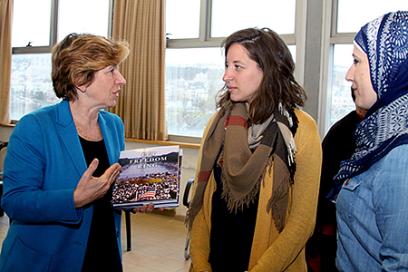Yearning to Breathe Free
I recently had the thrill of seeing the Broadway musical Hamilton, Lin-Manuel Miranda’s brilliant mashup of history and hip-hop. Alexander Hamilton’s story, of an impoverished youth immigrating to America and making his mark on his new country, is both remarkable and relatable. And it’s a reminder that our country has always been, and continues to be, shaped and enriched by immigrants. (Certain presidential candidates, take note.)
It also shows that partisan rancor and fierce disagreements are hardly recent developments. Our nation’s first leaders fought bitterly over everything from where the capital city would be located to federal versus states’ rights. But they agreed that certain principles were so fundamental to our character as a nation as to be inalienable. And while we have used the 240 years since the adoption of the Declaration of Independence to fight for civil and human rights for women and people of all races, ethnicities and sexual identities, freedom of religion was established from the start. This freedom cannot be switched off and on depending on current events. It is not dictated by the party in power, and it is not determined by bombastic businessmen-turned-reality-TV-stars-turned-presidential-candidates.
I believe the debasement of such principles in politics today is not just repugnant, it is un-American. To propose barring all Muslims from entry into the United States at a time when millions are seeking refuge from the carnage and chaos of war, fleeing terror themselves, is an affront to our founding values. The calls to close mosques and to create a national database of Muslims echo decades-old xenophobia, once directed at Jews, Italians and other “outsiders” who would become integral parts of the American fabric. And it’s just as wrong today.
The words etched beneath the Statue of Liberty remind us that America’s values make us a beacon of freedom: “Give me your tired, your poor, your huddled masses yearning to breathe free.” The Statue of Liberty looks out on where the Twin Towers once stood. Like all New Yorkers and all Americans, I understand the fear of terrorism and the urgent need to fight it. But we must emphatically reject the blanket assumption that all Muslims could be terrorists.
I was a teacher in New York City and president of the United Federation of Teachers at the time of the 9/11 attacks. In the ensuing days and weeks, educators counseled untold thousands of our schoolchildren, who had experienced unimaginable loss and trauma. And, as many Muslims and people mistaken for Muslims—including some students—were targeted in the aftermath of the attacks, the UFT produced a handbook for educators on how to foster tolerance and understanding, knowing that our public schools play a central role in promoting pluralism and inclusiveness. New Yorkers come from every corner of the globe, from every religion and race, and we were determined not to give Al Qaeda the victory of us turning on each other. President George W. Bush and New York City Mayor Rudy Giuliani, both Republicans, responded with similar pleas for tolerance.
Last week, in his final State of the Union address, President Obama called on Americans to consider the very character of our nation. “Will we respond to the changes of our time with fear, turning inward as a nation, and turning against each other as a people?” he asked. “Or will we face the future with confidence in who we are, what we stand for, and the incredible things we can do together?”
Across the country this weekend, Americans are celebrating the life and legacy of Martin Luther King Jr. Dr. King’s affirmation of the dignity and rights of all people resonates beyond our shores. In the Syrian town of Kafranbel, activists who have been fighting both the Assad regime and Islamic extremists for years have posted banners, written in English, to call attention to their struggle. They have also connected to other struggles, posting signs in support of Trayvon Martin’s family and the victims of the Boston Marathon attacks. Some of the banners have been smuggled out of Syria. One, displayed near the White House on the second anniversary of the revolution, borrowed the power of Dr. King’s enduring words: “I have a dream, let freedom ring from Kafranbel.”
I’ll end where I began, with Hamilton. For all their differences, the founding fathers sought compromises and forged alliances, knowing that they couldn’t lead a fractured country to strength. (Again—politicians, take note.) In the final act, these early Americans reflect on their lives and ask, “Who tells your story?”
Plurality. Diversity. Tolerance. Opportunity. Respect for all. At our best, these are at the heart of our nation’s story. We must tell it, and we must not allow anyone to rewrite it.

